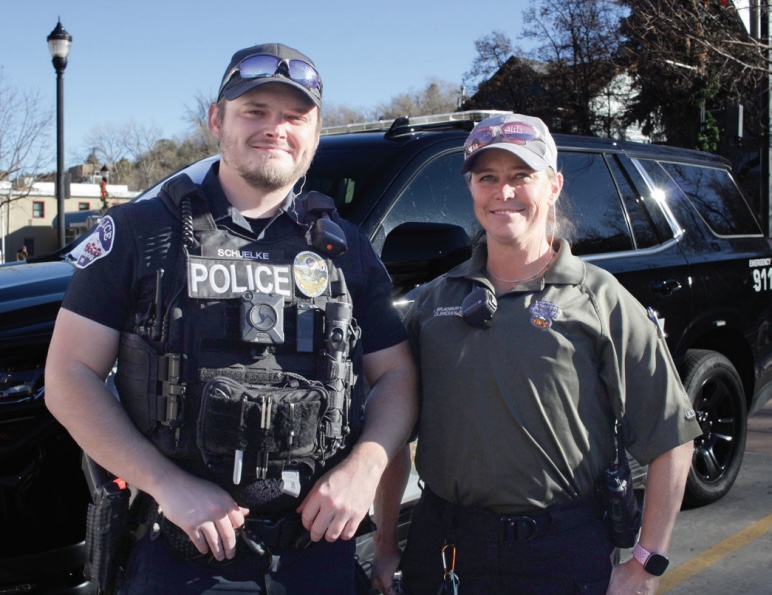In 2022, the Manitou Springs Police Department received 760 behavioral-related calls that were all fielded by regular patrol officers. They might have involved erratic behavior by someone experiencing a psychotic break, someone overdosing on drugs, someone out of control after a drinking binge or someone experiencing debilitating depression or suicidal ideation, many of them headed either for jail or a nearby emergency room for evaluation.
Since March 1, when Manitou Crisis Response 1 (MCR-1) was officially launched in partnership with UCHealth, Officer Jeff Schuelke and his team partner, Holly Bradbury, a licensed mental health practitioner with UCHealth, have gone on 240 mental health calls, offering either immediate medical intervention at a health care facility or counseling and follow-up if the crisis is manageable.
But it’s not really about the numbers, Schuelke said, it’s about making a difference in the community.
“We have seen a lot of success stories with people in town,” he said. “People who’ve gotten sober and are now sober for several months, people who’ve attempted suicide but with whom we were able to intervene before they succeeded. Quite a few people who follow up with us say we saved their lives.”
A 911 call coming into police dispatch may be related to a crime or suspicion of a crime, but just as often it’s related to a behavioral crisis associated with mental illness and necessitates a referral to MCR-1. Schuelke continues to work as an MSPD patrol officer, but mental health-related calls make up most of his work now.
We have seen a lot of success stories – Jeff Schuelke
“On some calls we take another officer along and intervene carefully, bringing Holly up to talk with the person when we know it’s safe,” Schuelke said.
Generally, they answer Manitou calls, but will fill in when El Paso County is short on responders, and vice-versa. No one knows why, but Manitou has an unusually high number of mental health-related calls per capita.
Suicidal and welfare checks comprise most of what the team responds to, though they can vary from extreme substance abuse crises to situational stresses that cause temporary crises.
“It could be someone who was recently widowed,” Schuelke said, “and we’re just sitting and talking with them.”

If a person is actively suicidal, either threatening harm to self or others or attempting suicide, they may be put on a 72-hour hold, but with the MCR-1 unit in place, that time can be spent receiving intervention or treatment at a mental health facility rather than lingering in a cell or an emergency room.
“The nice thing in our unit is that, with Holly, we can make direct placement in Peakview or Cedar Springs,” Schuelke said.
All MSPD officers are certified in mental health crisis response, but he said he’s learned most on the job with Bradbury.
Patrol officers are only authorized to take these people to an emergency room where treatment is often delayed or, in many cases, the patient is sent home without treatment or follow-up.
Sometimes MCR-1 makes an initial home visit, then returns the next week to check on the person and drop off Schuelke’s and Bradbury’s business cards so those in need can call their direct numbers the next time they experience a crisis.
This team and others like it around the country, including in the El Paso County Sheriff’s jurisdiction, have multiple goals. From a policing perspective, having a mental health professional along for a call on someone in the throes of crisis brings expertise to the table that sensitivity training just doesn’t provide, making difficult confrontations safer for both officers and individuals in need.
From the mental health care perspective, espoused by the National Alliance on Mental Illness, crisis response visits reduce arrests of people with mental illness while increasing the likelihood that they’ll receive mental health services.
Keeping law enforcement’s focus on crime and seeing the potential cost savings of community-based treatment compared to incarceration make these specialized response units both necessary and practical, given increasing numbers of behavioral health calls.
UCHealth, which had launched a similar partnership in Fort Collins, made funding available to train applicants to set up crisis response units in the Colorado Springs area in 2022. Bill Otto, Manitou’s chief of police, applied and received funding for his department.
“The fact of the matter is, oftentimes police officers are not the best people to respond to situations in which a licensed behavioral health clinician can use their expertise and training to better handle the situation,” Otto said when the program was launched in late February 2023. “This new unit is simply the best way to address any behavioral health-related calls.”
Schuelke said the chief offered any interested officer the opportunity to apply for the job; he did, and he got it.
Having an active mental health crisis response team within its police department puts Manitou ahead of the curve, moving in the direction of the future of policing, Schuelke said.
“We’re getting a team sooner than most places,” he said. “It’s pretty cool that we’re on the right track, moving forward into that kind of policing, addressing problems with the right resources.”

